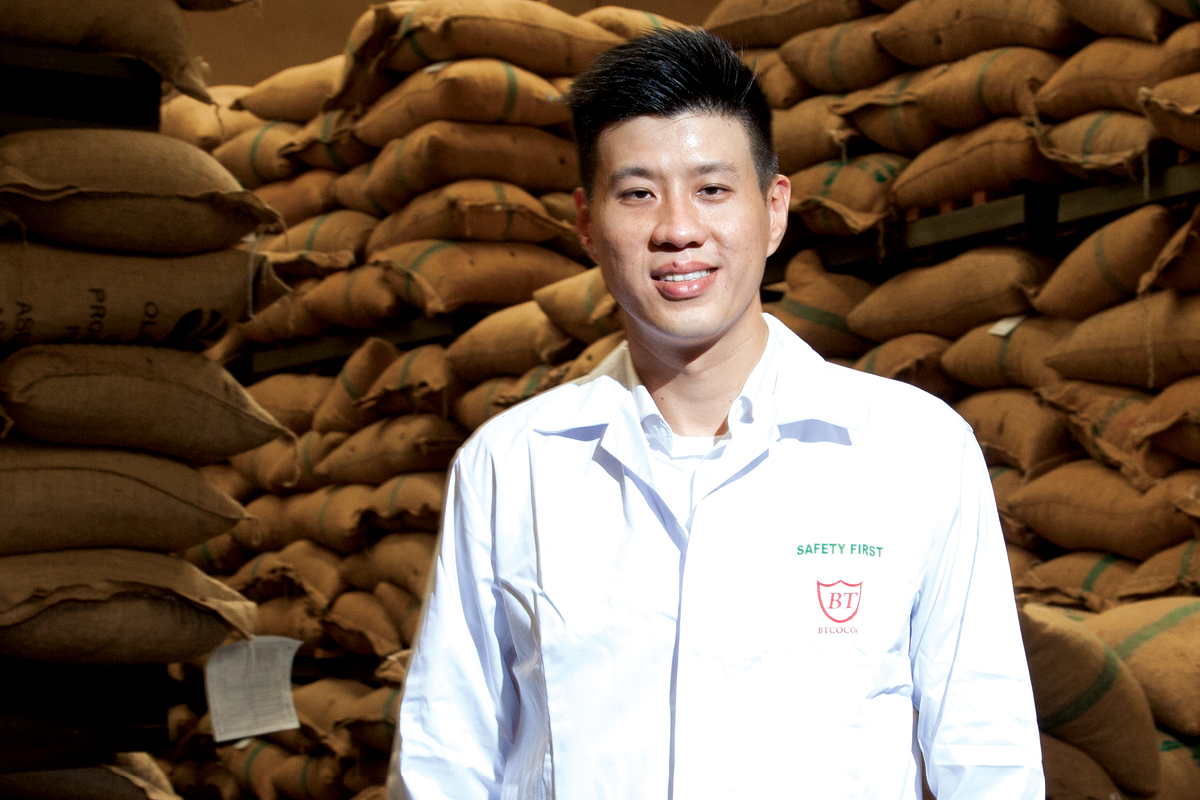About 400 cocoa beans go into making just 500 grams of chocolate. And with people around the world consuming more than 4.5 million tons of cocoa beans a year, the World Cocoa Foundation acknowledges this demand is set to increase. To prepare for this trend, businesses across the industry are working against the clock to upgrade their facilities, streamline their processes and increase operational efficiencies to satisfy the world’s craving for the sweet treat.

This includes BT Cocoa – the largest cocoa processing company in Indonesia. Owner Piter Jasman is readying his three children – Lukas, Juliana and Thomas – to continue to play an active part in the 150,000 ton-per-year cocoa operation. Lukas occupies the position of COO, Juliana is Chief Accounting and Finance, and Thomas leads the charge as CEO.
BT Cocoa supplies cocoa powder, butter and liquor to large internationally recognised brands such as Meiji, Nestlé and Mondelez International, as well as to local home-grown businesses. Its state-of-the-art facility is located close to Indonesia’s main port (Tanjung Priok) and to the customer base at Jabodetabek (Jakarta, Bogor, Tangerang, Bekasi). It is well positioned to take advantage of the growing demand for cocoa and chocolate products in Asia – currently the fastest growing region in the world when it comes to cocoa. This growth is being driven predominantly by China, India and South East Asia (at an average of 8–12% per annum).
“BT Cocoa will make the most of the increased demand over the next few years by simply continuing to do what we do best – produce high-quality cocoa powder, butter and liquor, and support our customers,” Thomas explains. “Thanks to all the hard work from the entire BT Cocoa team, the company is now recognised as one of the top quality and trusted processed cocoa product providers in Asia. Right now, there’s a lot of emphasis on product integrity and sustainable sourcing, especially in developed countries where people are interested in anti-deforestation and Fairtrade companies. Thus, we’ve made it our priority to comply with these standards and regulations, as well as with food safety, OHSAS and ISO standards.”
Given that raw material supply is one of the key factors in this industry, BT Cocoa has been collaborating with Olam Cocoa to strengthen the supply of cocoa beans from various origins such as Indonesia, Ghana, Cameroon, Ivory Coast, and others. BT Cocoa realises that good-quality cocoa products can only be achieved through a collaboration with the farmers who grow the beans.
This principle is the backbone of the BT CARE (Cocoa Assistance and Rehabilitation Efforts) program, established in 2012 with the aim of tackling sustainability issues at a grassroots level. “We’re focused on improving the communities around our factories, and this includes providing clean water and materials to build community centres,” says Thomas. “We’ve created a cocoa demonstration club, and we regularly meet with farmers to teach them how to increase production capacity and income.”
While cocoa demand is on the rise, supply in Asia is starting to decline as government incentives push Indonesian farmers to favour other crops such as corn, rice and palm oil. “This supply shortage is the first and the most pressing issue right now, particularly in Indonesia.” The government needs to make a program to help cocoa farmers to improve productivity and rejuvenation of the cocoa trees in order to increase the national cocoa bean production. If the national cocoa bean production can be increased it means that our cocoa farmers’ incomes can also increase.”
To help accelerate this process, BT Cocoa is focused on improving the efficiency and quality of the market. “We’ll continue to set high standards in the industry to remain competitive on the global stage,” he says. “We already have a highly experienced team with more than 100 years of industry knowledge but we are still investing in them to advance their skills. We make our employees feel like part of the family. We instil a sense of ownership, and I’ve found that if you stand by your people, they’ll stand by you.”
This approach also extends to BT Cocoa’s dealings with partners, suppliers and international investors. “We treat our customers like lifetime partners. Instead of an industrialist approach, we take a more human approach. That’s what has helped us form such strong relationships,” notes Thomas. “BT Cocoa is always open and welcomes cooperation with various parties because it brings mutual benefit.”
“For example, we place great emphasis on zero waste within the factory, and our partnership with VYNCKE allows us to burn our cocoa shell waste and turn it into energy. We started working with VYNCKE in 2007 when they built our very first biomass boiler. With more than 100 years’ experience and a strong local presence in this region, VYNCKE is a committed partner of ours. In turn, we’re using our network of contacts to help promote their machines within this region.”
“To us, success is more than profitability.”
These mutually beneficial relationships with customers, partners and communities form the bedrock of BT Cocoa’s growth platform in Indonesia and throughout Asia. “To us, success is more than profitability,” says Thomas. “We continue to learn and improve every year by facing and overcoming challenges to create a better industry and a better society. First comes purpose, then comes the money.” BT Cocoa’s short-term goal for the future is to improve efficiency in all areas, as well as to improve company performance.
For the long-term, the focus is on further cementing its position as a global cocoa provider that prioritises sustainable growth. Thomas adds that the overarching vision is to continue to meet the needs of its customers with a high spirit and integrity, while also ensuring sustainable growth economically and environmentally.



